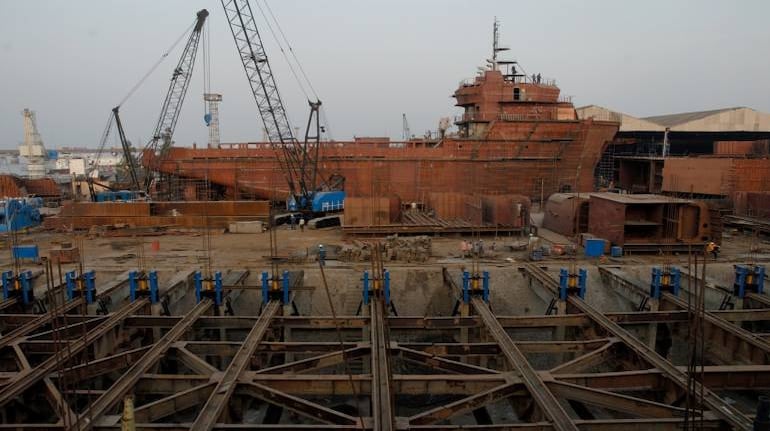



The government has decided to hold back its plans to double ship recycling capacity in the country by 2024 and is instead looking to come out with a new five-year plan to revive the industry.
Senior officials from the Ministry of Ports, Shipping, and Waterways told Moneycontrol that the government's plans to double ship recycling capacity in the country by 2024, especially at Asia's largest shipbreaking yard in Alang in Gujarat, have been put on hold.
"An unexpected global slowdown in the last two years, especially in European countries and the US, coupled with most major shipping companies drastically reducing their capital investment has led to slower execution of the government's plans," a senior shipping ministry official said.
In the budget for 2021-22, the central government had said that it would double the ship recycling capacity in the country by 2024.
With just half a year left, ship recycling capacity in India has fallen drastically since 2021-22 with no large ship coming to Alang, in Bhavnagar district, in the last nearly two years.
According to data from the Gujarat Maritime Board, the regulator for all the maritime activities in the state, Alang did 1.09 million tonnes of light weight displacement (LDT) recycling in the 2022-23 financial year against the capacity of 4.5 million LDT, its worst since 2007-08 when Alang managed 0.64 million LDT.
The data from the Ship Recycling Industries Association of India (SRIAI) suggests that Alang handled around 131 ships in 2022-23, falling from 298 ships in 2013-14, and 187 ships in 2020-21.
The official said that while the government has not abandoned its plans to develop the scrapping and shipbreaking yard in Alang in totality, a new five-year plan is being discussed at the moment to not only help the industry increase capacity but also diversify to reduce dependence on one industry.
"We are in discussion with shipbreaking units in Alang to not only help them increase capacity in the next five years but are also discussing plans to incentivise so that yards become compliant with European Union regulations," the official said.
Another senior government official said that the government is also working with shipping yards in Alang to set up vehicle scrapping centres in order to help the industry explore new options.
"Tax incentives, long-term loans and even a production-linked incentive scheme are being discussed at the moment to improve the financial health of shipbreaking units in Alang," the second official said.
The current scenario at AlangThe Alang yard caters to 98 percent of the Rs 5,000-crore ship recycling industry in India that employs more than 15,000 workers directly and several thousand indirectly.
Earlier this month the Gujarat government announced a financial support package worth Rs 28 crore for the revival of the Alang-Sosiya Ship Recycling Yard.
The package includes a waiver in housing cess of Rs 200 per sq meters, waiver in development charges by 50 percent and to waive Rs 35 per LDT for Indian flagged ships to be recycled, from Rs 135 per LDT to Rs 100 per LDT.
Shipbreaking units in Alang blame the slowdown in activity in the last two years on rising competition from neighbouring countries Bangladesh and Pakistan.
"Shipbreaking companies in Pakistan and Bangladesh are being compensated by their government when it comes to bidding for ships," an executive from a shipbreaking unit told Moneycontrol.
He added that competitors in neighbouring countries are ready to pay around $15-20 per tonne more than Indian companies as they have incentives provided by their governments that help them recover costs.
This is why buying and recycling has fallen drastically and 50 percent of the plots are lying idle in the yard, industry executives said.
In the ship-recycling industry, shipbreaking yards buy ships from shipping companies through tenders. Once the tender is awarded, these yards bench the vessel at their facility and strip down the ship to salvage steel and other material from the ship which is sold to make a profit.
Higher fixed costs have been making the business unsustainable, especially when the number of ships arriving is dwindling, industry executives added.
Bangladesh, industry executives say, can pay a higher price because scrap import is banned there, unlike India, and hence they are dependent only on recycled scrap.
Industry executives add that shipping companies are also delaying the retirement of ships since 2022, as freight rates have nearly tripled.
Mukesh Patel, former president of the Ship Recycling Industries Association, told Moneycontrol that the current slowdown in ships coming to Alang was also due to non-compliance of European Union (EU) norms by Indian shipbreaking yards.
He added that currently ship breaking units in Alang are much smaller than the permitted size under EU norms and, therefore, need to be merged to create bigger ones.
"Shipbreaking plots in India are on an average 100 metres wide, which is much lower than the norms required to get EU certified," Patel said.
He added that shipbreaking units in India also need to set up facilities to handle hazardous waste, create a separate area for breaking and segregating steel, and also set up medical facilities, training centres and hygiene facilities for workers to become compliant with EU norms.
Discover the latest Business News, Sensex, and Nifty updates. Obtain Personal Finance insights, tax queries, and expert opinions on Moneycontrol or download the Moneycontrol App to stay updated!
Find the best of Al News in one place, specially curated for you every weekend.
Stay on top of the latest tech trends and biggest startup news.